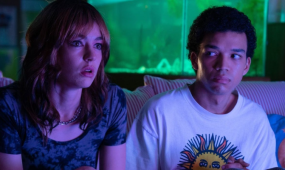The woman who fell to earth: Opening the door to Doctor Who and beyond
Films & TV
Reflecting on the new Doctor Who series, a parishioner from the Anglican Parish of Auchenflower-Milton reflects on how ‘the incarnation of God in Jesus, a human being, shows that God, like aliens, can be found in the most ordinary and everyday places and moments’

I should start this reflection by stating that I am not a Doctor Who fan, or ‘Whovian’ as they term themselves. The little I’ve seen has been ok, but a bit too scary or just downright weird for my liking.
Series 11 has just landed, and with it a new Doctor in the form of Jodie Whittaker. There has been some talk on social media that the Yorkshire accents of her and her companions have been hard to understand for those outside the UK.
This made me curious. I thought: “I’ll watch a little, just to test myself and see how thick it is”. Well, after watching the whole episode, I can say I loved it! I thought Jodie gave a brilliant performance, and the writers were also brilliant in creating an episode of drama, action and intrigue, with plenty of humour. I’m actually excited about watching more.
Watching this episode of Doctor Who all got me thinking about the stories we tell; specifically, about the kinds of stories we tell, and what that says about us.
Now, I’m no expert, but I think it’s fair to say that science fiction stories hold a certain fascination in our society, especially those featuring aliens. Somehow, they never seem to have had their day, but persist on and are continuously reinvented.
We seem fascinated by the idea that there is something beyond us – something more out there. A multitude of planets, some possibly similar to ours, the possibility of life elsewhere, even intelligent life, or “civilised galaxies” to quote the Doctor. All these things speak of a world that is bigger than we can possibly know. Perhaps, our thirst for worlds beyond our own is part of a bigger search for something more. Perhaps God should feature here, next to the aliens.
Advertisement
“No such thing as aliens, and even if there was, they ain’t gonna be on a train in Sheffield.” – Graham
Sheffield is too ordinary and too mundane. It’s not the sort of place you expect to find aliens. Yet, there they are on a train in Sheffield. It reminds me of the accounts of the birth of Jesus to ordinary, lowly people in an out of the way part of then Judea. “Can anything good come out of Nazareth? (John 1:46),” Nathaniel exclaims to his mate Philip when he reckons he’s found the Messiah. There is the same disbelief at the Divine being present in the most ordinary of places.
The incarnation of God in Jesus, a human being, shows that God, like aliens, can be found in the most ordinary and everyday places and moments. And that’s before we start talking about God being present in us through the Holy Spirit. The catch to all this, of course, is that we have to see it, to be able to realise it, because, of course, like the characters, we can always turn our backs and choose to bury ourselves in work or other potential distractions.
Advertisement
“Halloween’s next month mate. Eat my salad, Halloween!” – Dean, aka ‘Salad Man’
Now, viewers know it’s a dumb move to mock an alien warrior, but to the character unable to see beyond the ordinary, there is no other possible response. It speaks of our species’ lack of intelligence or awareness in the story to anything beyond its own experience. Similarly, human smartphone and other technologies are simple and unadvanced compared to sonics and gathering coils. They are all used to suggest that we are not as smart as we think we are. It also leads to questions of our place in the scheme of things, in relation to other planets and life systems, and perhaps also in relation to God.
“Good questions…More good questions.” – The Doctor
Questions are a good place to begin exploring. That’s because they involve an openness to what is beyond, and a willingness to explore that. The Doctor, whilst the authority figure of the show, does not by any means have all the answers. There is a chaos and messiness and, of course, plenty of mistakes. Yet, for those present, who do see and believe and follow, it is life lived beyond the ordinary and mundane. Adventures follow that are filled with purpose and meaning.
“It was Grace that showed me that life has more to offer.” – Graham
In the end it seems, relationships are most important. The episode ends with a funeral, the Doctor is farewelled, and a YouTube video highlights the impact of a particular person. Relationships and emotion emerge as defining features of humans in the show. Through relationships, we interact with each other and through them, we learn and grow. They give us the ability to go beyond ourselves, to touch something other, and perhaps if we are lucky, or just looking very carefully, to meet God in the most everyday of places.
And the Yorkshire accent was fine by the way, absolutely fine.





